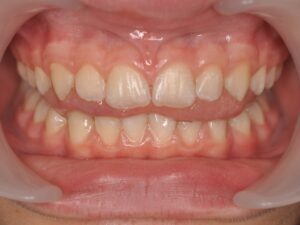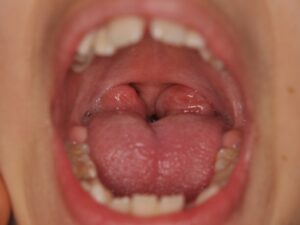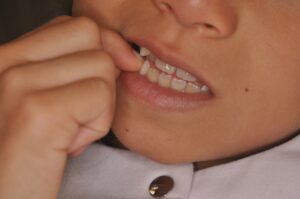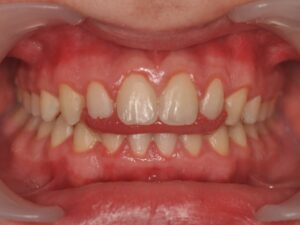Multidisciplinary Orthodontics
Collaboration Between Multiple Specialists
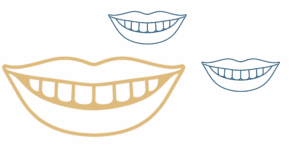
To restore both a functional and aesthetic smile, orthodontics alone may sometimes be limited or insufficient.
Dr. Kebaili may refer you to other specialists—before, during, or after your orthodontic treatment.
General Dentist - Pediatric Dentist
The general dentist for adults or a pediatric dentist for children is the first oral health professional. They perform most routine dental care: treatment of cavities, scaling, simple tooth extractions, gum care, dental prosthetics...
Essential Preliminary Check-up
Before any orthodontic treatment, a dental check-up appointment is essential. It is necessary to ensure the mouth is healthy: no cavities, healthy gums, no infectious foci.
Coordination with Other Specialists
- The general dentist can collaborate with the orthodontist, as well as with specialized practitioners such as:
- The endodontist (root care, root canal treatment)
- The periodontist (gum and bone care)
The oral surgeon is a general dentist specialized in oral surgery. They perform surgical dental treatments, especially to complement certain orthodontic treatments.
Indeed, during orthodontic treatment, certain surgical procedures may be necessary:
- Tooth extractions (wisdom teeth, premolars, odontoma, cysts...)
- Placement of orthodontic mini-screws (bone anchorage devices)
- Dental tractions (when a tooth is impacted)
These surgical acts are carried out in coordination with the orthodontist and are part of the overall treatment plan.
The occlusodontist is a general dentist specialized in the study and treatment of dental occlusion disorders and the temporomandibular joint (TMJ).
Associated symptoms:
- Jaw pain or locking
- Clicking and popping joints
- Bruxism (teeth grinding)
- Headaches of muscular or joint origin
- Orthodontics and Occlusion
Orthodontics can improve occlusion, but the results on the TMJ are sometimes limited. An occlusal assessment is recommended in case of persistent discomfort.
Complementary Treatment
The occlusodontist may collaborate with:
- Osteopaths (postural and joint work)
- Physiotherapists
- Orthodontists
The maxillofacial surgeon is a medical doctor specializing in the face, jaws, and oral cavity.
Link with Orthodontics
Some bone discrepancies are too severe to be corrected by orthodontics alone. Orthognathic surgery is then performed to reposition the jaws. This treatment is mainly for adults or post-growth adolescents.
Surgery Objectives:
- Correct bone abnormalities
- Improve occlusion, chewing, and breathing
- Harmonize facial features
- Relieve TMJ joint pain
(Ear, Nose, and Throat Specialist)
The ENT treats respiratory, swallowing, and voice disorders. They intervene when these issues affect jaw growth and teeth positioning.
Link with Orthodontics.
Chronic mouth breathing, a blocked nose, or large tonsils can disrupt jaw development. A palatal expander may be used to widen the upper jaw, promoting better dental alignment and breathing.
Tooth position is also influenced by oral functions (tongue, lips, cheeks) and harmful habits (thumb sucking, bruxism).
Tongue and Functional Re-education
To stabilize orthodontic treatment, it is often necessary to:
- Correct tongue posture
- Eliminate harmful habits
- Re-educate the orofacial muscles
Involved Specialists:
- Physiotherapist: facial tone, posture
- Speech Therapist: swallowing, breathing, speech
- Osteopath: functional balance, muscle tension
FAQ
Yes, a dental check-up is essential to ensure there are no pathologies before starting treatment.
There is no difference: in France, the official title is 'chirurgien-dentiste', although people commonly say 'dentist'.
From the appearance of the first baby teeth, usually around 1 year old. After that, regular visits to the child’s dentist are recommended, at least once a year.
At least once a year, even without pain. This helps prevent dental problems and enables early intervention.
- Brush teeth 3 times a day
- Use dental floss
- Avoid sugary snacks
- Maintain a balanced diet
- Have regular visits with the dentist
The oral surgeon specializes in complex dental surgery. They perform procedures that the general dentist does not.
- Complex extractions (wisdom teeth, impacted teeth)
- Dental tractions
- Placement of dental implants
- Bone grafts
- Treatment of cysts and benign tumors
- Biopsies and oral diagnostics
In case of jaw pain, clicking, locking, or if orthodontics does not relieve certain functional disorders.
- Jaw pain or clicking
- Frequent headaches or migraines
- Neck or muscle pain
- Worn or shifting teeth
- Jaw locking or popping
- Tinnitus, ringing in the ears
- Bruxism
When the discrepancy between the jaws is too significant for orthodontics alone.
It is primarily functional but also has aesthetic benefits.
After bone growth has ended, usually in adulthood.
Around 24 months total: pre-surgical orthodontics, surgery, then final orthodontic adjustments.
Not always, but it may be essential in cases of respiratory disorders.
Yes, especially in children. It can lead to dental malocclusions and poor jaw development.
The tongue directly influences tooth position. Poor posture can cause relapse.
At the beginning of orthodontic treatment, or even before for better effectiveness.
- Impaired jaw growth,
- Poor occlusion or tooth misalignment,
- Speech or swallowing disorders.
Thumb sucking is generally harmless if it stops before age 3. Beyond that, it can affect tooth growth and jaw development.

OPENING HOURS
Tuesday, Wednesday, Thursday, and Friday:
9:30 AM – 2:00 PM, 3:00 PM – 7:00 PM
CONTACT
+33 01 47 72 05 68
12 Place du Général Leclerc, 92150 Suresnes France
